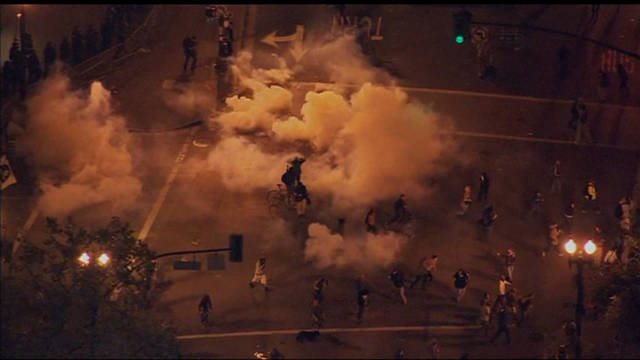
As "Occupy" demonstrations continue largely unabated, officials in cities across the country appear to be pressing for more strict control of the loosely defined group, raising the stakes for the movement as it stretches into its second month.
"These police actions only serve to galvanize the movement," said Michael Heaney, a University of Michigan professor who studies social movements. "It actually makes a lot more sense (for police) to just wait."
On Friday, authorities in lower Manhattan removed propane tanks and generators in Zuccotti Park -- an Occupy Wall Street home base in the city's financial district -- leaving demonstrators to battle the cold seeping through their blankets and sleeping bags.
"These are fire hazards (and) against the law," New York Mayor Michael Bloomberg said during his weekly WOR-AM radio show, adding "our first concern is safety."
Bloomberg said that up to 40 firefighters had removed six generators and several gasoline cans.
Demonstrators described the removal as an attempt to restrict Internet use and make their lives more difficult as a cold front moves into the region.
The action in New York comes one day after a California mayor apologized for violence against demonstrators that saw them tear gassed and resulted in the hospitalization of an Iraq war veteran.
Marine veteran Scott Olsen suffered a skull fracture Tuesday night after allegedly being struck by a tear gas canister in Oakland, according to witnesses.
"There is this new dynamic that goes on," said Susan Olzak, a Stanford University professor of sociology professor. "Both sides are losing patience and both sides can become entrenched."
Olsen, meanwhile, has become another rallying cry for the "Occupy" movement spreading across the country.
He has been listed in fair condition in the intensive care unit at Highland Hospital, according to a hospital spokesman.
Also Friday, hundreds of demonstrators in New York marched on the offices of five major banks and financial services firms, including Bank of America, Morgan Stanley, Wells Fargo, Citigroup and JP Morgan Chase.
They railed against what the group describes as corporate greed, arrogance and power, as well as their assertion that the nation's wealthiest 1% hold inordinate sway over the remaining 99% of the population.
"In one sense (the demonstrators) are right, the system is broken," Heaney said. "On the other hand, if you want to affect change, you can't be completely beyond the traditional institutions of American democracy. "
He said that large percentages of protesters appear averse to such staples of the government as congressional lobbying and the use of the courts.
"If you look at the civil rights movement -- how much more could the system be broken against African-Americans?" Heaney said. "But they engaged a whole repertoire to change the system.
"You have to have some sort of inside-outside strategy," he said.
Earlier Friday, police said 51 demonstrators in San Diego, California, were arrested for various charges of encroachment, unlawful assembly, illegal lodging and/or some form of obstruction of officers.
Three others were arrested on similar charges in Tampa, Florida, according to a police statement.
In Nashville, Tennessee, meanwhile, authorities said Occupy Nashville participants are now required to have permits. They also restricted the times they are allowed to gather.
In Atlanta, police arrested demonstrators at a downtown park overnight Tuesday. The arrests came after Mayor Kasim Reed said he sent ministers to the park "to see if we can find a way to resolve this amicably."
Reed told CNN affiliate WSB that concerns were increased when a man in the park was seen with an assault rifle. "We could not determine whether the weapon was loaded and could not get additional information on the weapon," he said.
Authorities ordered people to leave the park about midnight Tuesday, WSB said, going from tent to tent with flashlights. Arrests began taking place about 12:45 a.m.
Civil rights leader Joe Beasley later spoke to the demonstrators, telling them that he fears the work of Martin Luther King Jr. is being threatened.
"We see now a world that is more polarized than ever," Beasley said in a video posted online. "The rich is getting richer, and the poor is getting poorer."
Despite the crackdown, the movement does not appear to be losing steam.
Source: CNN